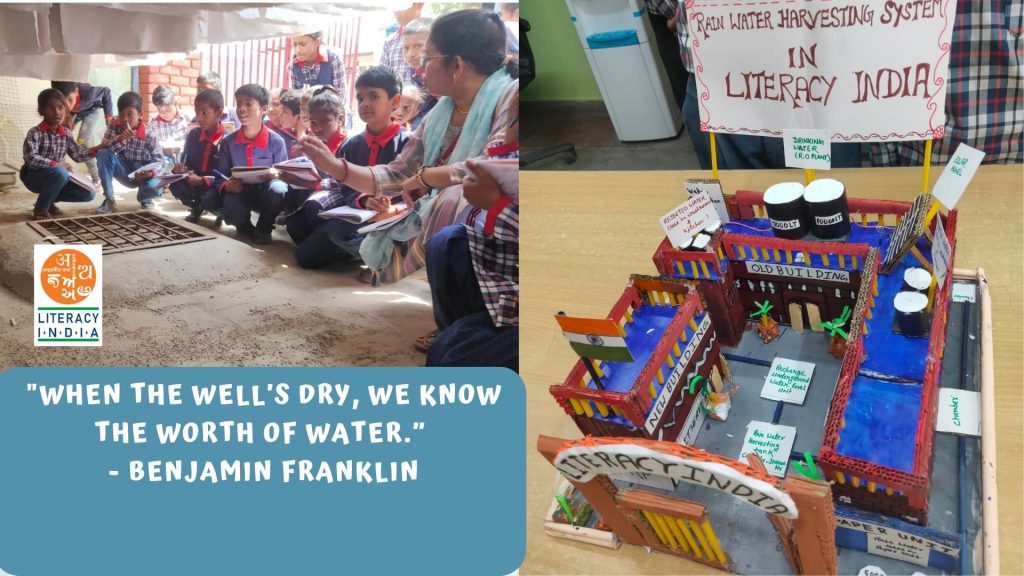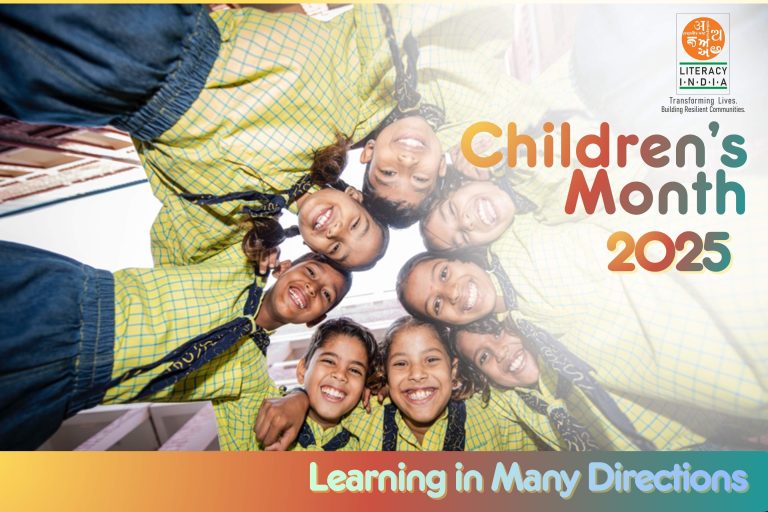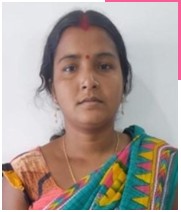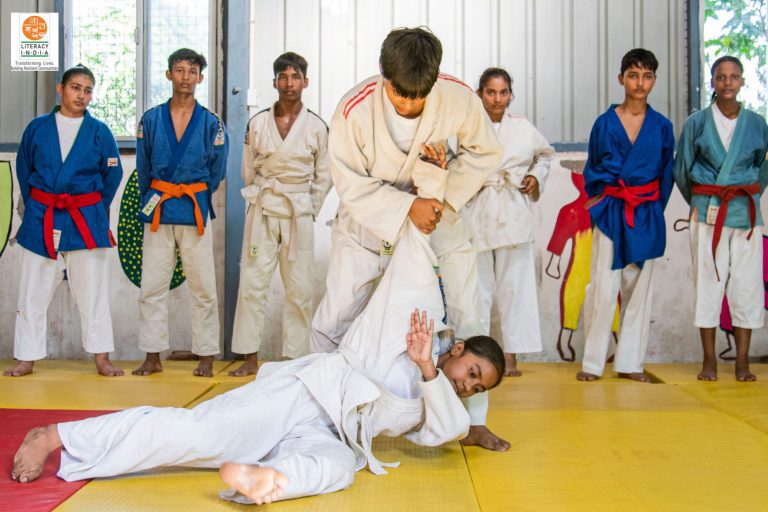“Rainwater Harvesting and Wastewater Reuse”- Learning through Project Work . Water is undoubtedly a precious resource and plays a vital role in our daily lives.
Recognizing its significance, some 350 students of classes 3rd to 6th of Vidyapeeth worked on the Project of Rainwater Harvesting and Wastewater Reuse. Aiming to create awareness about the sources of water, the need of water conservation, the limited availability of drinking water, different types of wastewaters, and the advantages of reusing wastewater. As part of experiential learning the teachers took the students to rain water collection and storage points and physically witnessed the collection mechanism, storing and the re-use of rain water. Students were explained about the functioning of the Rain Water Harvesting system that is installed in the Vidyapeeth campus and how Literacy India reuses even the waste water for the toilets.
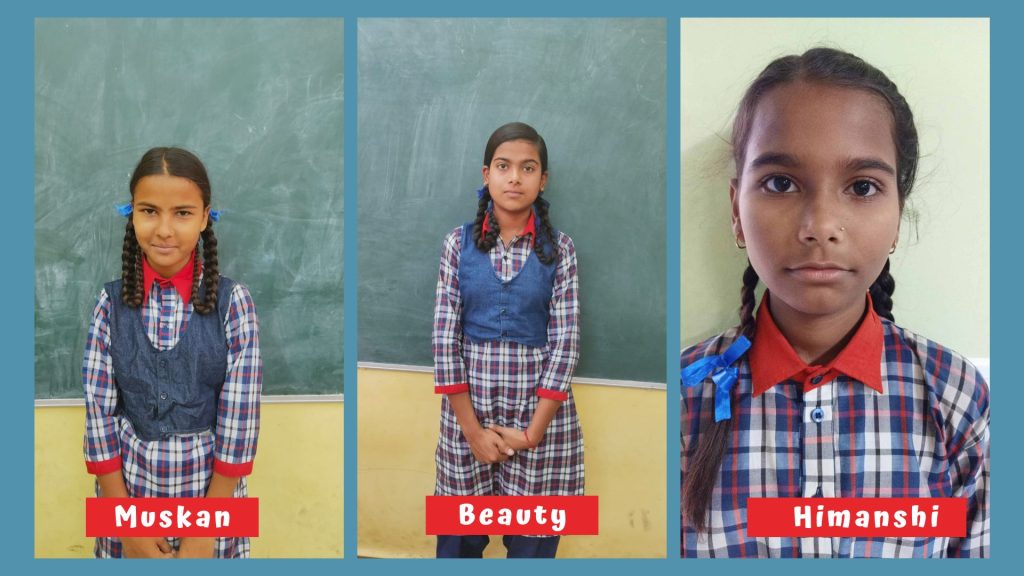
Muskan, Class 6th-B was amazed and said,” I did not know this earlier that rain water is being used in the in-house Waster Paper Recycling Unit of Literacy India.”
After this learning exercise Himanshi, Class 5th-B has started reusing the waste water at her home. She said, “After washing the vegetables at home, I now do not throw that water but reuse for watering my plants and I truly feel happy about it”.
Beauty 6th-D stated, “I now understand that usefulness of conserving rain water, whenever there are rains, I will make sure that I collect the water in a bucket for reuse.
By undertaking this project students understood the importance of water conservation and sustainable management of water resources for a greener and eco-friendly future.
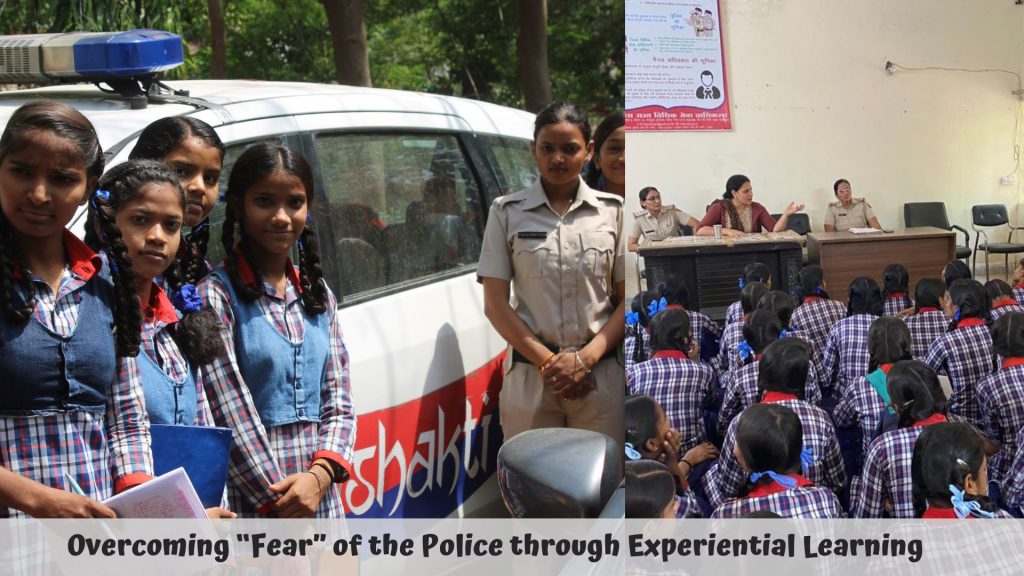
All, especially the children, adolescents and young need to be aware about their rights and duties. But, when it comes to Police and Crime, young students get fearful, confused and stressed. “Fearful” because they hear all the negative stories about the Police are often accused of and “Confused” because the students are told that it is the Police and its functionaries that are expected to help in solving a crime and maintain law and order.
Under Project Vidyapeeth of Literacy India, the emphasis is on experiential learning. Students go beyond the books and classroom to have real-life experiences and learn. Some 50 girls from the Secondary section of Vidyapeeth visited the Pink Police Station. Ms Mukesh, SHO Pink Police Station, Gurugram and her team of Women Officers informed students about various issues including Women’s Safety, Women’s Rights, Women’s Helpline numbers, Cyber Crime, Traffic Rules, Criminal Justice System and Self-Defence methods. Women officers also informed the young girls about the recruitment process for joining the police force.
The visit to an all-women police station was extremely useful for students as it provided a real-life experience of what students read in the social studies classes on civics and local administration and rights to become informed citizen. Moreover, physically seeing a police station as part of experiential learning and observing the functioning of a Pink Police Station was very purposeful. Whole exercise was conducted to nurture and instil respect for the Rule of Law and good citizenship practices.
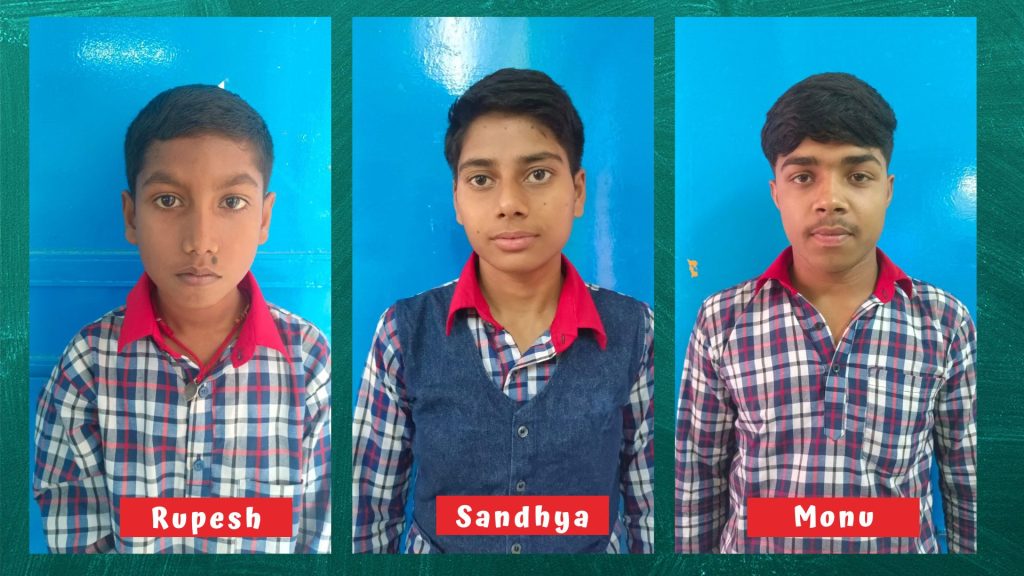
Sandhya, Grade X-A remarked that “during the discussion with Women Police officers I gained lot of knowledge especially about never to carelessly share personal photos on social media including other personal details such as phone numbers and addresses with strangers. I was most excited to receive information on how I can join the Police force. I will study hard to succeed”.
Yet another session to dispel many myths and misinformation that young students held in their minds about the role of police, traffic rules, cybercrimes, and personal safety for all the boy students of classes 7th to 10th .This was held with the officers of Bajghera Police Station, Haryana Police, Gurugram at Vidyapeeth, Literacy India.
The students raised several questions ranging from What is an FIR to What are the functions of the Police? However, some students were interested to know how we can change the public opinion that police take bribes from the public. The police officer stated that it is very unfortunate that such a perception exists, and it can only be changed through strict action against corrupt officers and by building trust and transparency mechanisms.
Rupesh is a student of Class 7th-B and stated that the through this workshop “I came to know that if a child commits any crime, then under the Indian legal system the child is not taken to a jail but treated differently and sent Children/Observation Homes under the Juvenile Justice System that aims to provide rehabilitation, counselling and education rather than punishment to the child.” The Sub-Inspector also emphasised that in case of “children” the focus is on reforming and reintegrating the child into society.
Monu Khan, Grade IX said that “I received some very useful information from this session, “I came to know about the Child Helpline Number 1098 that any child in difficult circumstances can dial for support and protection. I also got to know about the Emergency helpline number 112 along with other useful information on cyber-crime.”
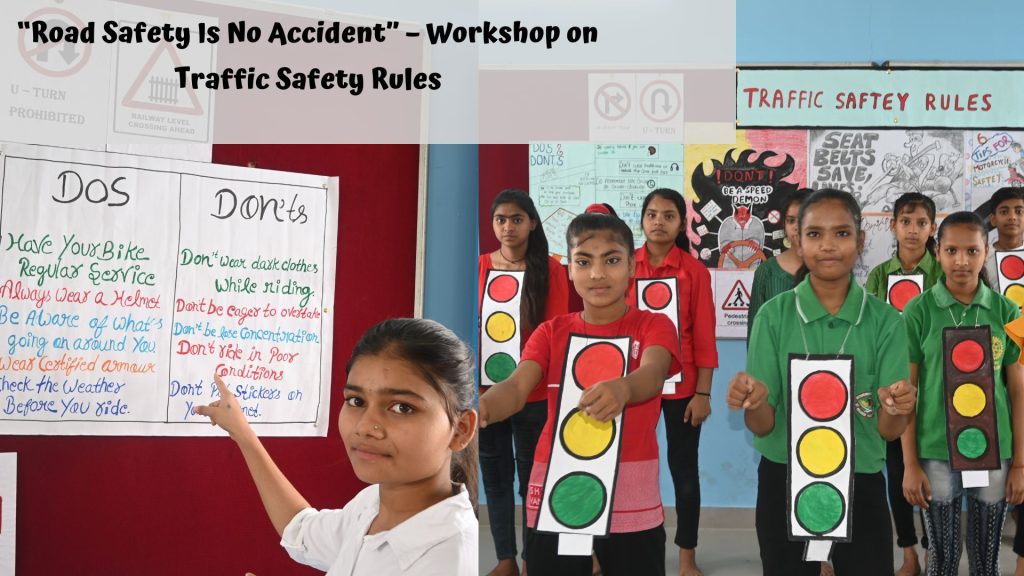
As the roads in the NCR region get busier by the day in the fast-converting semi urban areas into busy urban centres, it is important that young students are constantly reminded about the traffic rules and regulations. Therefore, for awareness building among the students of Vidyapeeth, several activities around Traffic Rules and Road Safety issues were held including Chart Presentations, Group Discussions, Song & Dance performances, and Teacher led classroom discussions.
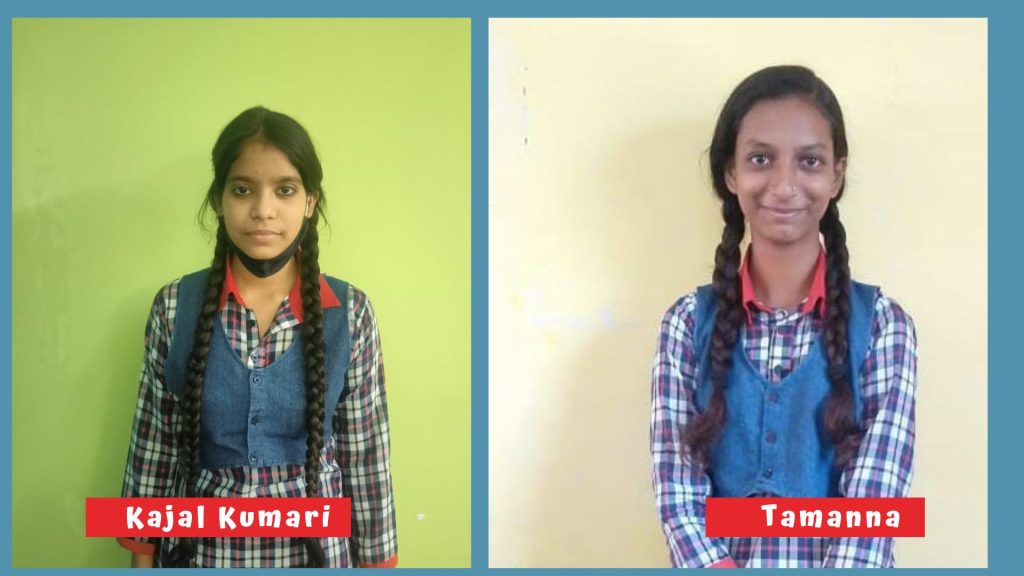
Kajal Kumari, X-A said, “I learnt that girls need to be careful about their “chunni” or “palllu” while driving two wheelers and not to drive until they have a valid driving licence and are 18 years adult. Moreover, while crossing the road we need to look left and right to ensure crossing the road safely.”
Tamanna, X-A stated that “I learnt that, as walkers, we should never use the underpass and always walk on the left-side of the road. Moreover, while driving a two-wheeler we should always use a helmet and wear the seatbelt while driving a four-wheeler.”
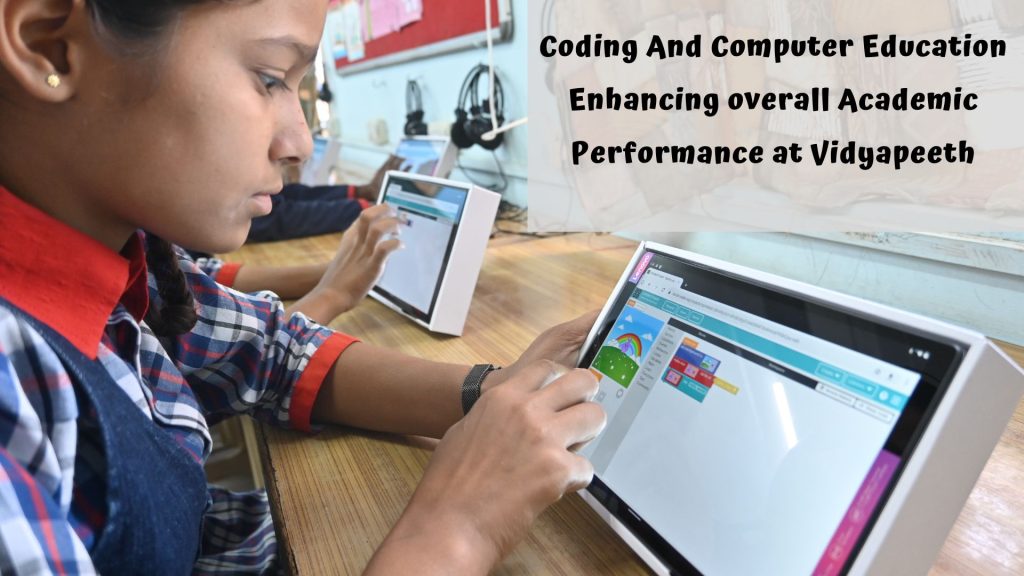
At Vidyapeeth, the recently announced result of Grade X students of the Haryana Board of Education was a testament to the fact that teaching Computer Coding skills directly helped in building STEM aptitude which in turn enhanced the academic performance of the students particularly in subjects like Maths and Science.

